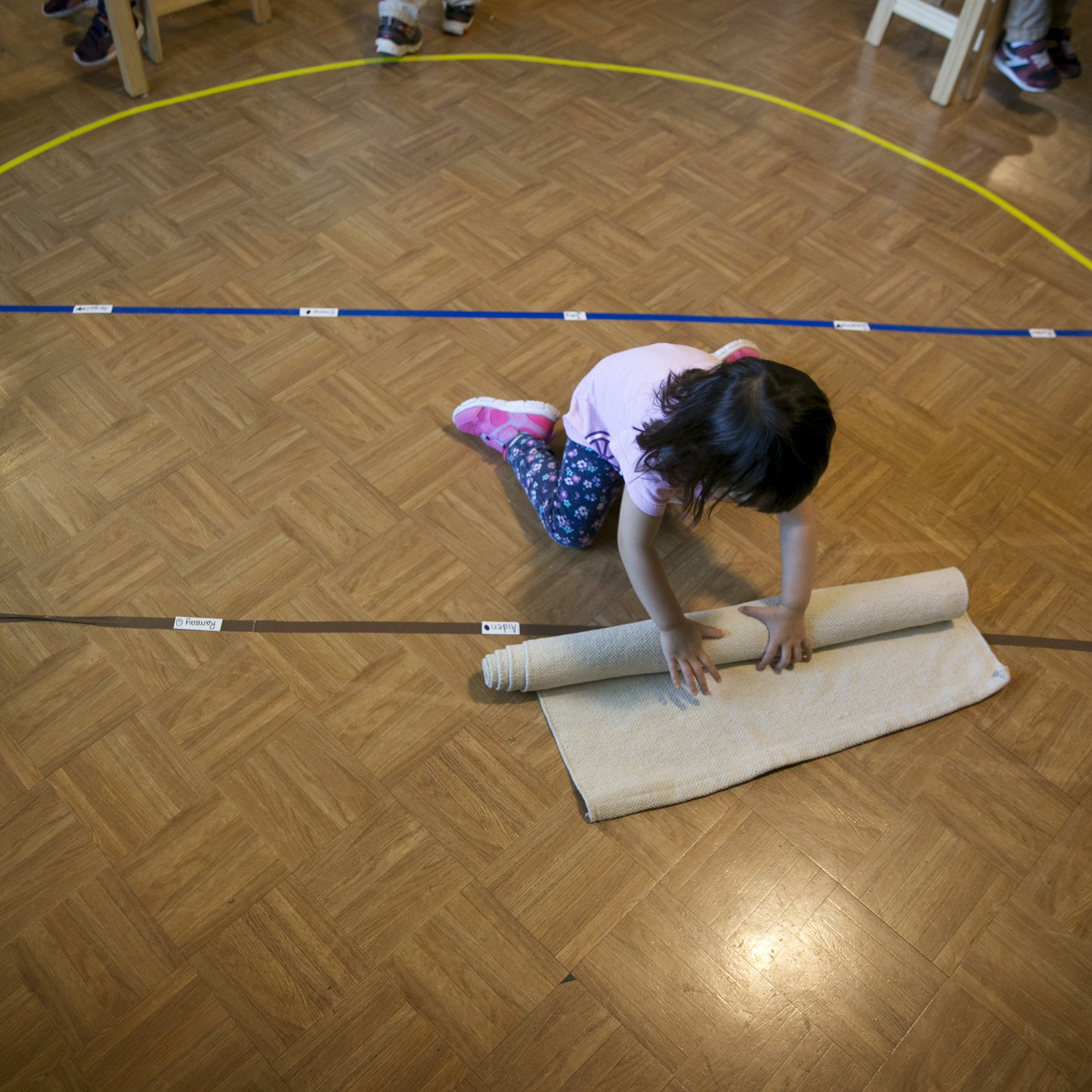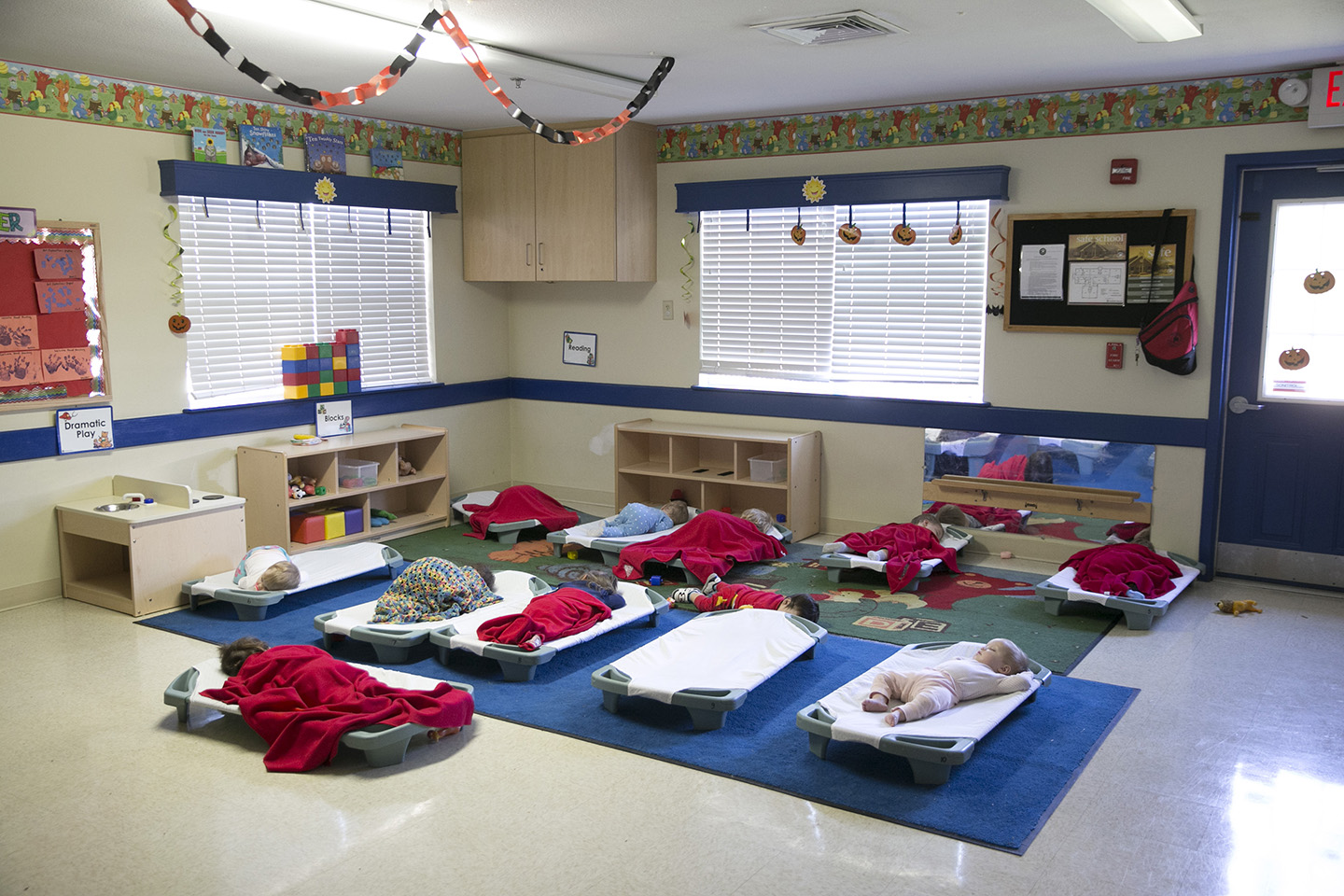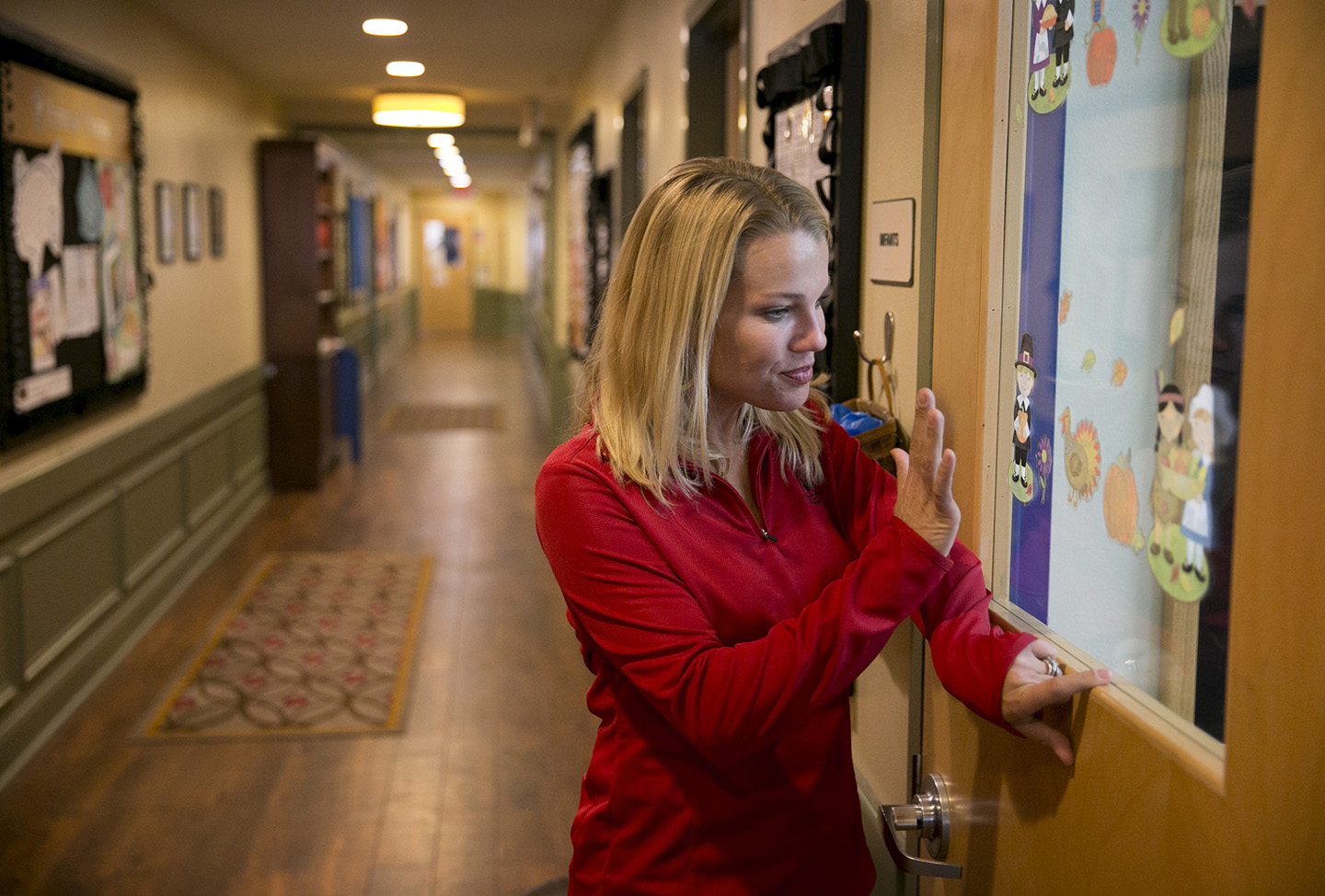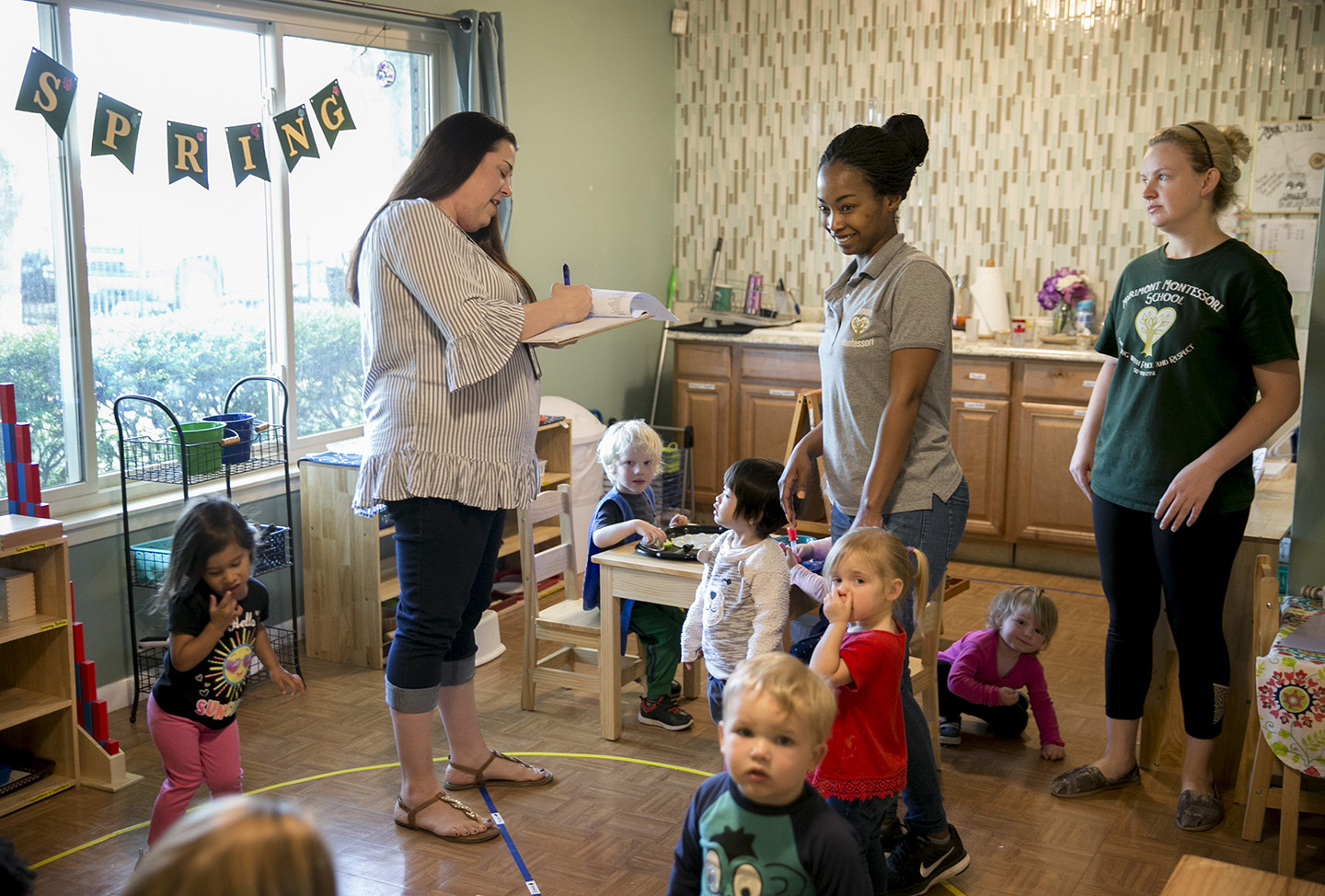Oversight
Texas leaves day cares
with high numbers of violations
open and practically
unwatched
How scores of
violations aren’t enough to
close a day care in Texas

By Andrea Ball
Austin American-Statesman | Dec. 6 2018
When it comes to oversight of day care problems, state investigators give operations a lot of leeway.
Academy of Learning in McAllen — which has gotten in trouble for feces on the bathroom walls, broken toilets, expired milk and staff members using cellphones while watching kids — had a total of 122 violations over a three-year period and was still operating as of November.
So was Little Feet & Learning Day Care Center in Laredo, which had 158 violations and has been in trouble for strapping a child to a chair, failing to conduct background checks and leaving children unsupervised.
Stepping Stones Learning Center in Sherman, which had 181 violations, has been cited for uncovered electrical outlets, refusing to give children water during snacks, bugs in the bathroom and out-of-control children. It, too, remained open.

The average Texas child care operation has nine citations. And yet, child care facilities with an extraordinary number of violations remain open, often without significant repercussions. While the worst actors usually come under extra scrutiny and monitoring by the state, they are often allowed to continue operating for years before being shut down — if they ever are.
The high number of violations for child care facilities that are allowed to operate raises questions about the quality of oversight the state provides. And incidents of injury and death that follow the violations suggest that, at least in some cases, the state’s enforcement strategy isn’t working.
An investigation by the American-Statesman has found:
As of Nov. 7, there were 16 day care operations with at least 100 violations and 222 with at least 50 within a three-year-period. Many of them were under some kind of enforcement action by the state, meaning they were being scrutinized more closely and being forced to make changes, but they remained open.
The average fine for day care violations is $112, and the state doesn’t financially penalize day care operators for some of the worst offenses. For example, of 800-plus violations for prohibited punishments in 2016 and 2017 by adults against children — slapping, pinching, pushing, hitting, etc. — not a single one resulted in a fine.
One third of the child care deaths that occurred between 2007 and 2017 occurred in legal day care facilities with the least oversight, which care for just a fraction of the state’s day care population.
The findings are part of the American-Statesman’s yearlong investigation into these and other problems at Texas child care facilities. The newspaper read thousands of documents, researched dozens of day care safety records, analyzed existing data and built its own database to find patterns and trends.
What the Statesman found was that dangerous conditions exist inside many Texas day care facilities, leaving hundreds of children in need of medical care and nearly 90 children dead as a result of abuse or neglect since 2007. In this series, the newspaper explores problems such as day care sexual abuse, deaths, injuries, illegal operations and state oversight. The newspaper also presents potential solutions to some of those problems.
Officials with Texas’ Health and Human Services Commission, which oversees child care facilities, say enforcement actions seek to give the operations a chance to fix their mistakes before coming down too hard and closing day care centers in a state with large waiting lists for child care.
But examples uncovered by the Statesman show that, at least in some cases, the state’s enforcement strategy, which gives child care operations second, third and fourth chances, failed to alter dangerous caregiver behavior before death or injury.
Between 2012 and 2017, 21 children died of abuse or neglect in legal child care facilities. Of those, several had received numerous violations that mirrored those that ultimately led to the children’s deaths.
In March 2016, 2-month-old Sebastian Bingley D died of asphyxiation in his Missouri City in-home child care after being laid down to sleep on a couch. His caregiver, Thelma Coleman, had been cited two times previously for unsafe practices, including not placing infants to sleep on their backs and putting them to bed with blankets.
Each time, the state spoke to Coleman about these mistakes. The violations went on her record, but Coleman was allowed to keep operating.
After Sebastian’s death, Coleman pleaded guilty to child endangerment and received deferred adjudication.
In 2014, a 7-month-old baby suffocated after being swaddled, placed on his side and not supervised at All In The Family Child Care Services D in Oak Cliff, according to state records. The operation had been cited three other times for failing to properly supervise children.
In 2013, a child died at Marcela’s Day Care D in El Paso after a substitute caregiver put a baby to sleep in a crib with additional mattresses and bedding, according to state records. The day care operation had previously received nine citations for problems with its substitute caregivers.
“We are always on the lookout for patterns and repeat issues,” said Carrie Williams, spokeswoman for the Texas Health and Human Services Commission, which oversees child cares.

But before taking action, the state considers how the operation responded, how often it was cited for the same violations and whether there are systemic issues to address, she said. Sometimes the state levies fines against child care operations or increases the number of child care licensing inspections. Sometimes it works with the child care facility on a plan of action to improve.
“Our focus is the safety of children in care and working quickly to correct problems we see so that children are as safe as possible,” Williams said.
The Statesman’s review of state data also shows that several child injuries came after a series of red flags that seemed to signal future problems, raising questions about whether state regulators are doing enough to prevent harm to Texas children.
For example:
- Rainbow Academy in Irving had been cited three times for inappropriately punishing children before a caregiver roughly put a child down on a mat and fractured the child’s collarbone in 2016, according to state records. The day care facility is now under new ownership and has new employees.
- Xplor-West Rayford in Spring had been cited twice for failing to properly watch children before an unsupervised 4-year-old was hurt in 2017 on the playground’s parallel bars and needed medical attention, state records indicate. In the following months, the day care facility was cited two more times for failing to supervise children properly.
But Kasey Redus, owner of Primrose School of Vista Ridge in Cedar Park, says what can look like a pattern is sometimes more complicated. Her child care center — a large brick building tucked behind a shopping center — was cited four times for failing to properly supervise children before a 5-year-old boy fell off a table and broke his arm in 2017, state records show.
Redus said that, unlike some day care operations that hide incidents, she voluntarily reports each and every violation, in part, to get everything on the record in case of future questions.
“We don’t want there to be a mystery,” she said. “It’s documented and there for the whole world to see.”
But Redus added that often there is more to those situations than state records show. In the case of the boy with the broken arm, the staff was watching him, she said. A caregiver told him to get off the table and, as he did, he fell and hurt his arm. Still, the child care center was cited for failing to properly supervise him.
“Even when you see someone fall, you can’t put on a cape and fly over and catch them,” Redus said. “You can’t get over there that fast.”
She also wishes the state’s online records were clearer about the incidents because, to someone who doesn’t know what happened, the sometimes vague narratives leave room for interpretation.
Enough enforcement?
Texas’ toughest punishment is to close down a child care operation, but it rarely happens. In 2017, the state revoked the licenses of 24 child care centers across the state. Twenty-seven other centers were put on probation.

To be sure, shutting down day care facilities would exacerbate the existing shortage of child care. Many day care centers have months-long waiting lists.
So the state has begun to focus more on providing day care operations more detailed technical assistance on how to comply with state rules, Williams said. An online library provides information on scores of topics such as background checks, nutrition, child safety and emergency plans.
The agency also has put more emphasis on allowing child care facilities to complete voluntary action plans so they can make changes without going through time-consuming red tape involved with a punitive system. Under the plans, state inspectors act as mentors of sorts, guiding the child care operators through the needed changes. Sometimes, caregivers are required to get additional training.
“We’ve generally seen an increase in compliance over the years as providers become more equipped to meet or exceed standards, which also may have a role in having fewer enforcement actions,” spokeswoman Kelli Weldon said. The agency could not provide proof of that and said their conclusion was based on anecdotal evidence.
Yet weak enforcement action extends even to caregivers who deliberately hurt children.
In one 2017 case, a caregiver in Corpus Christi tossed a child with special needs across the floor, according to state records. A center in Houston was cited in 2016 because children were hit with hands or sticks as a form of discipline.
Both were allowed to remain open. Neither was fined.
Williams said the state’s intent is to quickly ensure that children are protected in these situations. Inspectors work to make sure everyone is trained properly or, if necessary, that substandard caregivers are removed. Sometimes, inspectors visit the child care facility several more times to ensure everything is going smoothly.
“Generally, monetarily penalizing a facility is not immediately going to make children safer,” she said.
Between September 2016 and June 2018, the state issued more than 2,700 penalties totaling more than $300,000, mostly for failure to conduct background checks and failing to put children to sleep safely.
The result was an average fine of $112. Small fines are not enough to alter behavior, said Michelle McCready with Child Care Aware, a national organization that advocates for high-quality child care.
“Fifty dollars here, $50 there, a slap on the hand isn’t going to do that,” she said.
While the decision of how and when to fine is in the hands of the Health and Human Services Commission, the amount of the financial penalty is not. Per state statute, the highest fine the agency can levy is $150 per violation and that’s for the largest child care centers. The smallest ones can receive a top penalty of $50 per violation.
State Sen. Kirk Watson, D-Austin, said the state needs to have harsher penalties that encourage child care operators to follow the rules. Raising the fines is an option, he said, but he also wants to ensure that such penalties don’t financially threaten day care facilities, forcing them to close or pass on the cost to parents.
But allowing child care centers with scores of serious violations to continue operating is unacceptable, Watson said. There needs to be teeth in the punishments levied against day care facilities, he added.
“People need to know that certain actions are going to result in negative consequences,” he said.
Other states have used strict oversight, and out-of-the-box solutions, to avoid deadly outcomes.
For years, Colorado dealt with at least four or five sleep-related deaths annually. Then the state decided to do something different. Now, every time a child care provider is cited for using an unsafe sleep practice — putting a baby on its stomach for a nap, for example — licensing inspectors notify every parent using the day care facility. The state then collects a fine from the child care provider and uses some of it on wearable blankets for babies and a parent-focused safe-sleep campaign.
Since February 2017, there have been no sleep-related deaths of infants in licensed Colorado child care facilities.
“So much stress”
Running a day care operation is complicated business. Texas has more than 1,100 rules child care facilities must follow to operate in compliance with what are called “minimum standards.” The standards dictate specific requirements in areas such as supervision of children, nutrition and communication with parents.

“You are constantly being scrutinized, and, depending on whether your center has cameras, a parent might call and say, ‘What is going on with my kid?’” said Traci Mackintosh, former president of the Texas Licensed Child Care Association.
All violations go on the public state database that lists citations for individual child care operations on a website. The database contains three years of inspections, but after that, the violations can no longer be seen without specifically requesting records from the Health and Human Services Commission, meaning older incidents are effectively scrubbed from the online record. The most common problems are inadequate supervision and failure to do background checks.
Meanwhile, the online violations don’t always provide enough information for parents to tell what exactly happened.
Although hundreds of child care operations rack up scores of violations, that doesn’t necessarily mean that a day care facility is bad, said Kara Waddell with Child Care Associates, a nonprofit child development organization in North Texas. Some child care operators are extremely conscientious and will report even the slightest infraction, she said.
Some operators complain the state focuses too much on small things and say they are unclear about what is expected of them.
Lorie Garza, who ran the All Star Kidz Learning Center in Mission, said she was unfairly targeted by the state.
According to public records, the child care center had been cited for problems including a failure to conduct background checks, not putting children to sleep safely and failing to supervise children properly. By October 2018, she had racked up about 150 violations over a three-year period.
Garza told the Statesman that she knew the high number of violations looked “horrible.” But she was also frustrated with licensing officials because she felt like they were being too picky.
“I got cited because I didn’t have tweezers,” she said.
She said she was trying to meet the standards but felt like she wasn’t getting the guidance she needed from the state.
Williams said that inspectors regularly work with child care providers to educate them on how to fix and avoid problems.
“Our staff presents at local community meetings and attends statewide conferences,” Williams said. “We also send email blasts to providers to promote safety resources and send out information to community groups.
That’s not how Garza saw it. “It’s been hell,” she said. “They’ve given me so much stress.”
In October, the state revoked Garza’s license. She said she is fighting the revocation.
Dan Keemahill contributed material